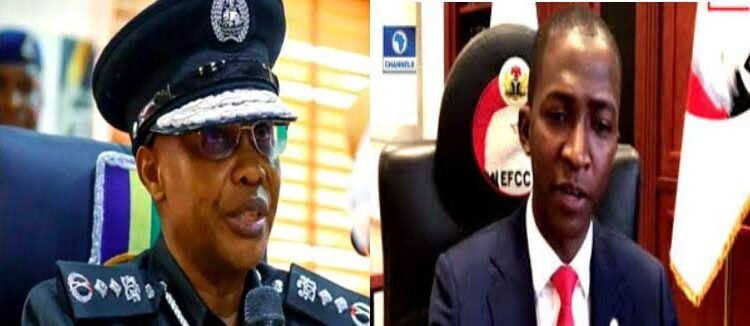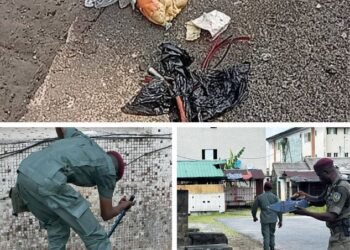A filed a petition with the Federal Capital Territory Police Command seeking redress for an injustice I suffered. The petition, dated March 23, 2021, detailed a case of unlawful confiscation of my properties and a criminal breach of trust.
The suspect had deceptively confiscated my Honda Accord car, a brand new Dell laptop and a colour HP Printer.
But weeks after the petition was submitted, there was no word from the Police. Worried by the deafening silence, I contacted the Commissioner of Police at the time to inquire why the petition was not acted on. But the CP said the issues raised in my petition were not within the purview of the Police.
According to him, they were within the mandate of the Economic and Financial Crimes Commission (EFCC). Consequently, he advised that I file the petition with the EFCC. Following his advice, I filed a fresh petition dated April 19, 2021, and addressed it to the Chairman of the EFCC, Mr Abdulrasheed Bawa. It was officially received and acknowledged.
It is pertinent to state that in my separate petitions to the Police and EFCC, I supplied the suspect’s mobile telephone contacts alongside mine, to ease the investigation. But several months after, there was no word from the EFCC either.
A few days after I filed the petition, I got hints that the suspect had been arrested by EFCC operatives. I waited in vain for the anti-graft agency to contact me to enable me to state my case against the suspect. I then filed a reminder, dated July 7, 2021, to the EFCC, stating among others, that I was aware of the suspect’s arrest and wondered why I was not invited to state my case against him.
I got no reply. I was forced to call the attention of the EFCC Chair Bawa to the matter. I forwarded the cover pages of my original petition and the subsequent reminder to Mr Bawa through WhatsApp. Almost immediately, the EFCC chair responded through a WhatsApp call, saying that neither the original petition nor the reminder was brought to his attention.
Mr Bawa said he was in Europe for some official engagements at the time but he promised to make his findings right away and get across to me through his men on the ground.
Less than two hours later, I received a telephone call from a Special Assistant to the Chairman, Ngunan Kakwagh. The aide told me that the EFCC had indeed prepared a written reply to my petition and the subsequent reminder but that the agency could not locate the address for onward delivery to me. I had to be physically present at the agency’s head office the very next day where I was handed the letter.
The letter, dated September 3, 2021, reads: “We refer to your letter dated 19th April 2021 and reminder dated 7th July 2021 addressed to the Executive Chairman of the Commission on the above subject matter. We have reviewed your petition and found that it does not fall within the Commission’s mandate.
“Consequently, your petition was referred to the Inspector General of Police vide letter ref. no. EFCC/EC/IGP/09/534 dated 11th May 2021 for investigation. Please accept the assurances of the Executive Chairman’s highest regards and respect.” Kakwagh signed the letter on behalf of the EFCC Chairman.
The letter was silent on the issue of the arrest of the suspect, which I raised in the reminder petition. I demanded to know why the suspect was arrested without me being contacted. The aide admitted that the suspect was indeed arrested then. But the aide said he was arrested based on a separate petition filed against him by a different complainant. A coincidence? But does that not say enough about the suspect acting true to character?
In that letter, the EFCC claimed to have referred my petition to the IGP vide a letter dated May 11, 2021. But it took the personal intervention of the EFCC chair for me to get it on September 3, 2021, which is four months after. The wording of the letter gave the impression that it was written after a review of my original petition of April 19 and the subsequent reminder of July 7. If this was the case, then EFCC’s referral letter of May 11 is deemed to have preceded the review of the reminder of July 7 by 51 days.
I filed the petition with the office address of the Abuja Bureau of The Nation Newspapers for easy accessibility. But the EFCC claimed they could not trace the address, so the letter was kept in their files for four months. However, at the intervention of the Chairman, they found the telephone number with which they contacted me.
I proceeded to the office of the Inspector General of Police (IGP) to trace the said referral letter from EFCC. There was no trace of the letter there. A concerned police officer at the Force Headquarters advised I file a fresh petition with the FCT Police Command.
I was emotionally drained at this point so I had to take a break to reflect and to allow me to gain some inner strength.
I resumed the pursuit about a year later with a fresh petition dated September 13, 2022, addressed to the FCT Commissioner of Police. There, I met a new CP who, without much ado, received the petition by himself. After reading through it, directed that it be sent to the Criminal Investigation Department (CID) for investigation.
After days of surveillance, the suspect was brought in for interrogation. He admitted being in possession of my car, laptop and printer but he said he was not prepared to return them to me.
After days of running back and forth, the police ordered him to return the three items in his possession to me. On his own terms, he asked to be given three weeks to replace the laptop and the printer. He set a four-month timeline to either return the car or pay a mutually agreeable value for it.
But that was just one leg of the two-pronged petition. The other leg, which is much more high-ended, bordered on criminal breach of trust. Investigation into that aspect, which is considered to be within the mandate of the EFCC, is now being kept in abeyance at the CID.
After much dithering, the suspect replaced the brand-new laptop with an unserviceable one that looked like something he picked from a junkyard.
Also, he procured a badly refurbished printer as a replacement for the new one he collected from me. I promptly indicated my rejection of the unserviceable laptop. The two items have been gathering dust at the CID office since then.
The four-month timeline he set himself to replace or pay for the car expired on January 31, 2023. But he asked for a further extension of time till February 28, 2023. It was granted but he still defaulted. Apparently, as a decoy, he obtained my bank account details through the Police to enable him to transfer the agreed sum to me. He never did.
I called the investigating CID officer on March 14 to report that the suspect had yet to pay up. The officer replied that the suspect had been ignoring his telephone calls and text messages. And as you are reading this piece, the suspect is still being evasive while police investigators appear helpless. That’s where we are now.
I must state here that the investigation process at the CID has not only been frustrating but also distressing. As the complainant, I had to, on two occasions, wait with the investigators for the suspect to arrive for scheduled appointments.
On one occasion, I had to leave after waiting for an hour without the suspect showing up. At every turn, they made it look like I was begging for some underserved favour. That has been the attitude and body language of the suspect, and even the investigating police officers.
In the course of arresting and investigating the suspect, I was made to part with N50,000 for “logistics”. I was also made to pay an additional N100,000 for the “processing of documents”. That’s besides other incidental expenses I incurred along the line. A case of double jeopardy?
Worried by the frustrating turn of events, I approached a certain EFCC officer who I fortuitously ran into at a recent public event. I narrated my experiences to him following which he requested to see a copy of my petition. I gave him a copy a few days later and I waited for his opinion.
After going through the contents, he opined that I ought to have filed the petition with the EFCC instead of the Police. He was categorical that it’s purely a matter for the EFCC – that is the aspect bordering on criminal breach of trust.
According to him, it shouldn’t take the EFCC much time to crack the case and resolve it decisively. He was momentarily flustered when I handed him a copy of the EFCC letter that referred the petition to the Police. Reading through the letter, he paused for a moment, reflected briefly, and with measured subtlety, said: “Something must have gone wrong somewhere.”
There and then, he advised I withdraw the petition from the Police and file a fresh one with the EFCC. It’s quite distressing that a petition that originated in 2021 is being tossed back and forth, first from the Police to EFCC, then back to the Police. Now, I am being advised to withdraw the petition from the Police and file it afresh with the EFCC. Again?
The question is: will the EFCC take a second look at the petition if it is withdrawn from the Police? What if the agency decides to, once again, send it back to the Police as it did in the first place? Will it not be back to ground zero? It has been an unending circle of motion without movement from 2021 to date. The law, truly, is a dumb ass that even the crooked can ride. So where do I go from here?
ABOUT THE AUTHOR
Ogunwale works with The Nation newspaper.








